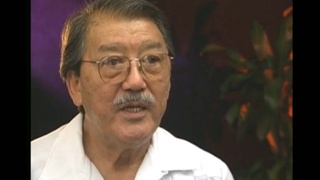Interviews
Need for Monetary Compensation
And Henry was very strong and he and Shosuke are, I would say, the ones that convinced me of the rightness of individual payments. Of the rightness of asking for monetary compensation.
Apology fine, you know, we need that, but you need monetary compensation to back that up. Because—and the phrase that sticks in my mind is "our American system of justice" —you don't go to court and just say you've been wronged or damaged. There is always a monetary award. It's like Bill Marutani says, if you have a traffic ticket, you don't go down and apologize that you did wrong. The judge is not going to say, "That's fine that you're sorry." There is monetary, and that's our system.
And so gradually, you know, when they brought that out, it, then I gradually began to accept it. Because initially so many of us felt, you know, you don't ask for money. I mean, it doesn't seem right. Somehow it seems like you're asking for a handout and it was putting a value on this, too.
Date: September 26, 1997
Location: Washington, US
Interviewer: Becky Fukuda, Tracy Lai
Contributed by: Denshō: The Japanese American Legacy Project.










